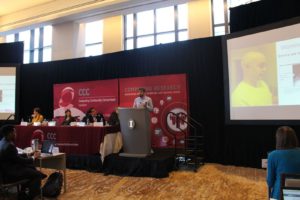 So far the 2017 hurricane season has been disastrous, however, as we learned today at Day 1 of the Computing Research: Addressing National Priorities and Societal Needs Symposium, it could have been even more disruptive if not for current computing research.
So far the 2017 hurricane season has been disastrous, however, as we learned today at Day 1 of the Computing Research: Addressing National Priorities and Societal Needs Symposium, it could have been even more disruptive if not for current computing research.
Plenary speaker Michael Dunaway, from the University of Louisiana at Lafayette, explained that hurricane tracks have been very accurate this year. This is because computational models have gotten very good at predicting the direction of the hurricane at the upper atmosphere level. As a result of better predictions, officials decided not to evacuate the city of New Orleans for Hurricane Nate on October 4th because they could trust the predicted track of the storm. This ended up saving the city millions of dollars in unnecessary spending on an unneeded evacuation. This is just one example of how computer research has impacted the world that was discussed today.
Day 1 was organized around two themes:
- Intelligent Infrastructure for our Cities and Communities
- This session highlighted some of the major advances taking place now, while at the same time emphasizing the substantial body of research, much of it crossing disciplinary boundaries, that still needs to be done.
- As Michael Dunaway said, “we need to do all of this to build not only the cities of the present but the cities of the future.” He challenged the audience of computer science researchers to “think about what you do and build resilience into your projects so that it can be expanded on.”
- AI and Amplifying Human Abilities
- This session looked at the emerging role of AI in augmenting human abilities in new and powerful ways. Speakers focused their remarks in application areas ranging from health, transportation, universal access, data analysis, and education.
- Plenary speaker Thad Starner remarked that our AI systems cannot live in this world without us since they do not have the data for it. They only have the data that we teach them. When an audience member asked about the fear of AI taking our jobs, he explained that they cannot take our jobs but instead AI will change jobs and make them more interesting. As we amplify our systems, it will only create new potential.
Day 2 will be livestreamed here starting at 8:30AM EDT on Tuesday, October 24th. Topics covered will be: Security and Privacy for Democracy, Data, Algorithms, and Fairness, and Connecting Computing with National Priorities. You can also join the twitter conversation using #CCCsymposium!
For more information about the symposium please see the agenda and symposium website, where slides and video archives will be posted.









